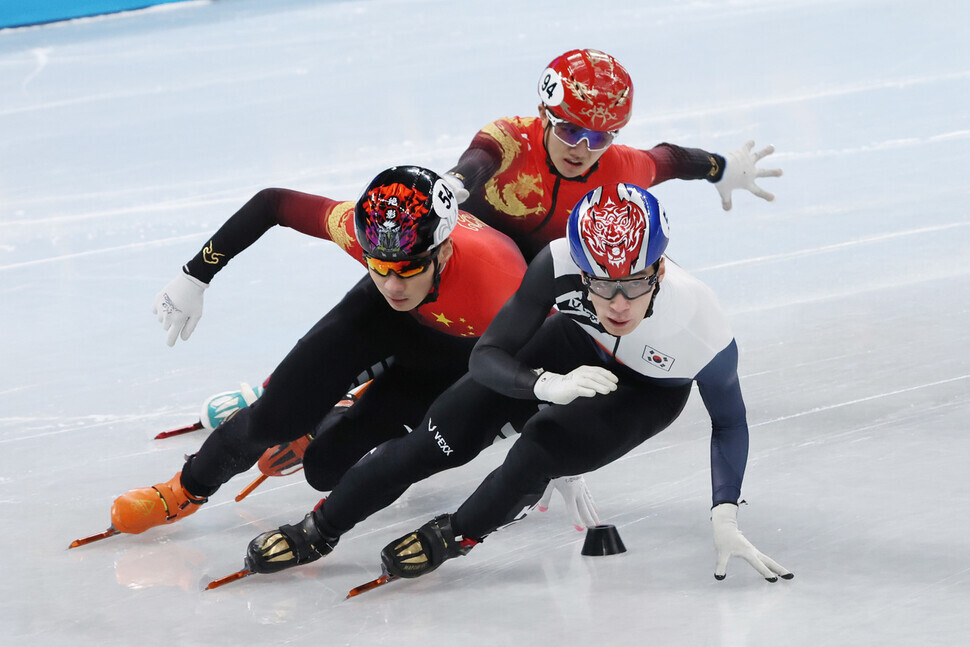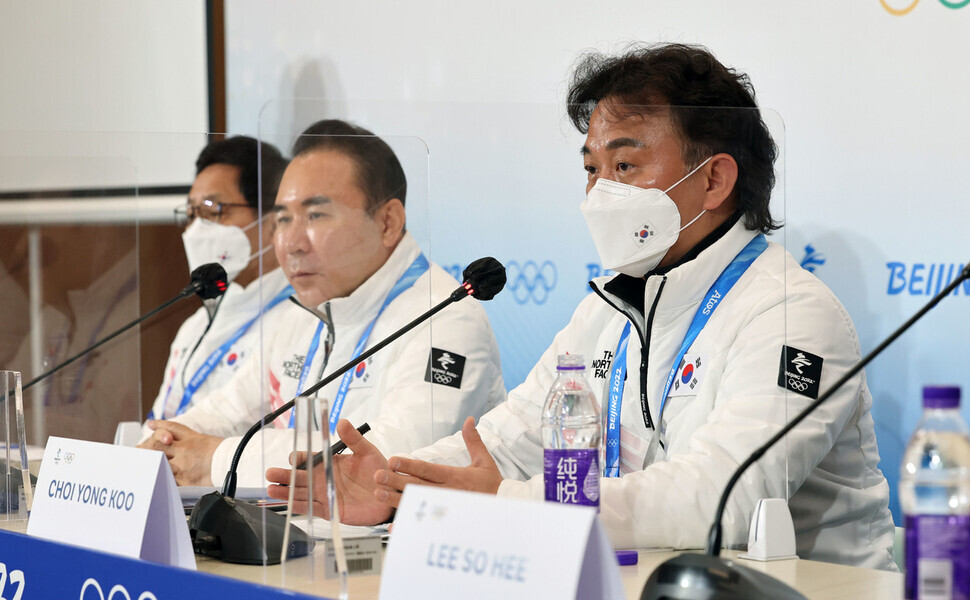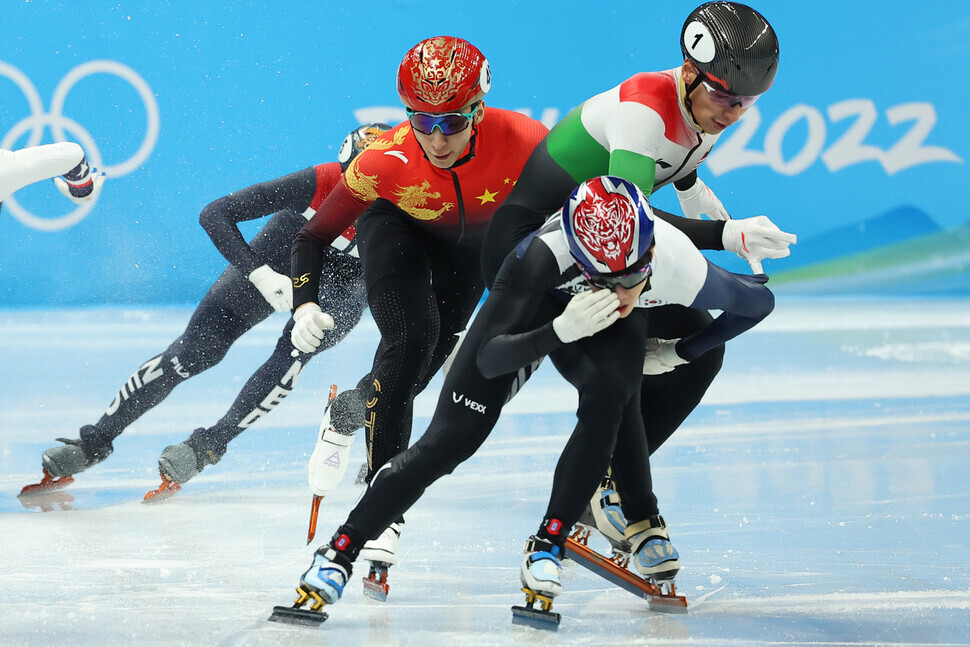hankyoreh
Links to other country sites 다른 나라 사이트 링크
Short track’s dilemma: Arbitrary judgment standards take precedent over athletic skill

Shock. Anger. Bafflement.
Those three words may sum up the response to the way short track speedskating has unfolded thus far as the 2022 Winter Olympics in Beijing.
The competition on Monday was a clear example. South Korean skaters Hwang Dae-heon, 23, and Lee June-seo, 22, were both disqualified in the men’s 1000-meter semifinal for illegal moves.
The following finals also came down to a judges’ ruling. The first skater across the finish line was Hungarian Shaolin Sandor Liu, but he wound up without a medal when a video review resulted in him being given a penalty.
Meanwhile, Chinese skaters ended up with gold and silver, despite not a single one of them being the first over the finish line that day. The rulings were enough to raise some major questions — basically rendering the video reviews and rankings useless.
The South Korean Olympic squad reacted immediately by objecting to the rulings against Hwang and Lee to the International Skating Union (ISU). But in an official statement, the union signaled that it had no intention of overturning the rulings.
Hwang, it said, had made “an illegal late pass causing contact” with another skater, adding that “no protests against the officials’ decisions concerning disqualification or non-disqualification for violation of any racing rules are allowed.”
In a press conference called Tuesday morning at the Main Media Center in Beijing, the South Korean squad announced plans to respond with a complaint to the Court of Arbitration for Sport (CAS). It also said it would protest the matter directly to International Olympics Committee (IOC) President Thomas Bach.

The squad stressed that neither Hwang nor Lee had made contact with other skaters.
Choi Yong-koo, director of the South Korean short track speedskating team’s support group and an international judge for the event, said, “Hwang Dae-heon employed a tactic of digging inward.”
“There was enough space from the start of the corner, and he was able to get in without any problems or any collision,” he added.
“It looks like the ruling was based on the judges’ incorrectly reading the gesture of one of the Chinese skaters.”
Choi also explained that Lee had “started off the race normally from the inside lane and made his way to the second in the pack, skating without issue around the same corner.”
“The referees disqualified Lee because he made a sharp pass on the inside, but from my review of the footage, I think the Hungarian and Chinese skaters were in the wrong,” he said.
There had been concerns about the judging since before the event. Faced with repeated ruling controversies at tournament after tournament, the ISU increased the share of responsibility attributed to passers for any collisions or obstructions that arise during their passes. In ambiguous situations, the passing skater gets penalized.
It’s resulted in multiple disqualifications at this season’s ISU Short Track Speed Skating World Cup. It has left skaters alert to the possibility — as South Korean team member Kwak Yoon-gy put it — that you can “get disqualified for brushing sleeves.”

The bigger problem is the arbitrary nature of judging. In short track speedskating, rulings are made by a team consisting of one chief referee, two assistant referees, and one video referee. While they may discuss rulings, authority for the final decision lies with the chief referee.
Choi called it a “system that leaves things up to the chief referee’s conscience,” adding that there had been “talk [internally] about how it might need to follow a system of majority decision.”
Short track coach Lee So-hee said, “Because of the stricter ruling situation, the athletes went through grueling training to avoid any kind of contact.”
“Yet [the South Korean skaters] ended up disqualified without any contact, while Chinese got through unscathed despite flagrant violations,” she complained.
In the short track mixed team relay semifinal on Saturday, China finished third behind Hungary and the US. But it ended up making the finals when the US was penalized, and it eventually won the gold.
At the time, the Chinese skaters’ failure to touch batons drew jibes about the so-called “Bluetooth touch.” But the judges did not take issue with the clear violation of the rules.
Critics also said the video decisions were effectively determining the outcome of races. While the replays can help rescue skaters from false accusations, they can also serve as a weapon for imposing penalties.
Some observers said that a situation where athletes are more worried about rulings than skills could spell crisis for the sport as a whole. They’ve also voiced concerns that the stiffer rules imposed due to repeated ruling controversies could sap the joy out of the event.
This is what Choi meant when he stressed, “Referee calls should not govern competitions.”
The South Korean team is currently hard at work training for the men’s 1,500 meter and women’s 1,000 meter qualifying, which take place on Wednesday. Its focus is on keeping up morale and fighting its hardest in the remaining events.
By Lee Jun-hee, staff reporter
Please direct questions or comments to [english@hani.co.kr]

Editorial・opinion
![[Column] How opposing war became a far-right policy [Column] How opposing war became a far-right policy](https://flexible.img.hani.co.kr/flexible/normal/500/300/imgdb/original/2024/0702/5017199091002075.jpg) [Column] How opposing war became a far-right policy
[Column] How opposing war became a far-right policy![[Editorial] Korea needs to adjust diplomatic course in preparation for a Trump comeback [Editorial] Korea needs to adjust diplomatic course in preparation for a Trump comeback](https://flexible.img.hani.co.kr/flexible/normal/500/300/imgdb/original/2024/0702/9717199086060096.jpg) [Editorial] Korea needs to adjust diplomatic course in preparation for a Trump comeback
[Editorial] Korea needs to adjust diplomatic course in preparation for a Trump comeback- [Editorial] Silence won’t save Yoon
- [Column] The miscalculations that started the Korean War mustn’t be repeated
- [Correspondent’s column] China-Europe relations tested once more by EV war
- [Correspondent’s column] Who really created the new ‘axis of evil’?
- [Editorial] Exploiting foreign domestic workers won’t solve Korea’s birth rate problem
- [Column] Kim and Putin’s new world order
- [Editorial] Workplace hazards can be prevented — why weren’t they this time?
- [Editorial] Seoul failed to use diplomacy with Moscow — now it’s resorting to threats
Most viewed articles
- 110 days of torture: Korean mental patient’s restraints only removed after death
- 2[Editorial] Korea needs to adjust diplomatic course in preparation for a Trump comeback
- 3Nine dead in Seoul after car plows into pedestrians
- 4[Column] How opposing war became a far-right policy
- 5Korea to create dedicated population strategy ministry to combat low birth rate, aging society
- 6Samsung Electronics workers to go on first strike in company’s 55-year history
- 7[Editorial] Silence won’t save Yoon
- 8Son Heung-min’s father, brother accused of child abuse at football academy
- 9Dreams of a better life brought them to Korea — then a tragic fire tore them apart
- 10Japan is building a military meant for more than self-defense — and has the US to thank for it